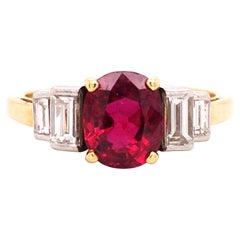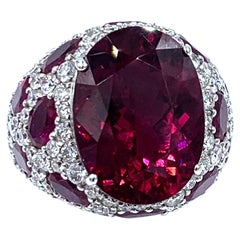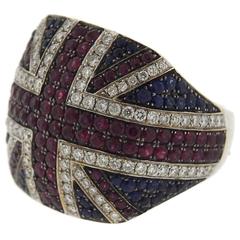Asprey Ruby Ring
20th Century Band Rings
Diamond, Ruby, Gold
Recent Sales
20th Century British Cocktail Rings
Diamond, Rubelite, Ruby, 18k Gold, White Gold
21st Century and Contemporary British More Rings
Diamond, Ruby, Sapphire, 18k Gold
Antique Early 1900s English Edwardian Engagement Rings
Diamond, Ruby, 18k Gold
People Also Browsed
21st Century and Contemporary French Contemporary Lever-Back Earrings
Diamond, 18k Gold, White Gold
Vintage 1950s American Link Bracelets
Lapis Lazuli, Blue Sapphire, Turquoise, 18k Gold, Yellow Gold
21st Century and Contemporary American Contemporary Engagement Rings
Diamond, 18k Gold, Yellow Gold
Vintage 1970s French Engagement Rings
Diamond, Ruby, Yellow Gold
20th Century Engagement Rings
Diamond, Emerald, 18k Gold
21st Century and Contemporary Modern Cocktail Rings
White Diamond, Spinel, Platinum
21st Century and Contemporary Japanese Modern Cocktail Rings
Ruby, Diamond, Platinum
2010s French Cocktail Rings
Diamond, Sapphire, Platinum
21st Century and Contemporary American Modern Engagement Rings
Sapphire, White Diamond, Diamond, Platinum
21st Century and Contemporary Unknown Contemporary Cocktail Rings
Diamond, Sapphire, Blue Sapphire, Platinum
21st Century and Contemporary Art Deco Cocktail Rings
Diamond, Sapphire, Platinum
Early 20th Century European Art Deco Retro Bracelets
Diamond, Ruby, Platinum
Vintage 1960s American Dangle Earrings
Coral, Diamond, Turquoise, 18k Gold, Yellow Gold, Gold
Late 20th Century Wedding Rings
Diamond, Platinum
20th Century Burmese Art Deco Three-Stone Rings
Diamond, Ruby, Gold, 18k Gold, White Gold
2010s Italian Modern Engagement Rings
Blue Sapphire, White Diamond, Diamond, White Gold, 18k Gold
Asprey International Limited for sale on 1stDibs
Favored for over two centuries by European royalty, movie stars, rock music legends and England’s elite, Asprey International Limited’s reputation for creating elegant, high-quality furniture, jewelry and decorative objects is without equal. The storied manufacturer’s motto — “It can be done” — exemplifies their approach to design, which has proven over time to be both dynamic and enduring. To this day, Asprey International Limited remains a go-to purveyor of luxury goods and bespoke design services.
The roots of Asprey International Limited can be traced all the way back to 1781 when it was founded by William Asprey in Mitcham, Surrey. The business moved to its revered modern location, 166 Bond Street, in 1847. The company’s highly accurate regulator clock, once displayed in the window of their flagship, became a frequent stop for Londoners wishing to reset their watches.
Asprey first gained renown for its manufacture of exquisitely engineered dressing cases, which were compact pieces of luggage that travelers would use to tote their cosmetics and toiletries. At the International Exhibition of 1862, the company received a gold medal for its excellent dressing-case designs and also earned a Royal Warrant from Queen Victoria for their manufacture. Upon his ascension to the throne, King Edward II introduced incredibly formal Buckingham Palace court presentations, balls and soirées, resulting in a huge demand for diamond jewels starting with his coronation in 1902. The court jewelers Asprey, Garrard, Carrington and the newly opened London branch of Cartier were all overwhelmed with orders for sumptuous diamond jewelry to be worn at the king’s elaborate coronation. Currently, Asprey International Limited holds a Royal Warrant from His Royal Majesty Charles, Prince of Wales, for jewelry and silver.
Asprey continued to build its reputation for the production of luxury goods including tableware and silverplate pieces throughout the Victorian period and into the early 20th century. Especially known for its designs of the 1920s and ‘30s, Asprey International Limited considers the Art Deco period to have been its golden age. Their designers embraced the spirited originality of the period with open arms, and Asprey enjoyed a time of intense creativity and debuted a wealth of iconic creations throughout the mid-century modern period, too.
Asprey artisans have designed bespoke pieces for such notable celebrities as British musician Ringo Starr and American actress Angelina Jolie. They have also designed made-to-order accessories for Hollywood movies, most notably the Edwardian-style “Coeur de la Mer,” which was a piece of costume jewelry from James Cameron’s 1997 hit, Titanic. The company’s recreation of the piece — this time designed with actual gems sourced from Sri Lanka — fetched more than $2 million at a fundraiser held in Princess Diana’s honor in 1998. Asprey previously acted as the official jewelry designer for the BAFTA awards and collaborated with Ferrari’s Formula 1 team during the late 1990s.
Asprey International Limited has received many awards and recognitions for its timeless designs. Most notably, it was awarded the Queen's Award to Industry in 1975. The London College of Arms bestowed upon the brand a new official coat of arms in 2006 to mark its esteemed 225-year-long legacy of excellence.
On 1stDibs, find antique Asprey International Limited decorative objects, lighting, serveware and silver and jewelry.
Why Gold Shines in Jewelry Craftsmanship
Gold is the feel-good metal, the serotonin of jewelry. Wear vintage and antique gold necklaces, watches, gold bracelets or gold rings and you feel happy, you feel dressed, you feel, well, yourself.
Gold, especially yellow gold, with its rich patina and ancient pedigree going back thousands of years, is the steady standby, the well-mannered metal of choice. Any discussion of this lustrous metal comes down to a basic truth: Gold is elementary, my dear. Gold jewelry that couples the mystique of the metal with superb design and craftsmanship achieves the status of an enduring classic. Many luxury houses have given us some of our most treasured and lasting examples of gold jewelry over the years.
Since its founding, in 1837, Tiffany & Co. has built its reputation on its company jewelry as well as its coterie of boutique designers, which has included Jean Schlumberger, Donald Claflin, Angela Cummings and Elsa Peretti. There are numerous gold Tiffany classics worth citing. Some are accented with gemstones, but all stand out for their design and the workmanship displayed.
For the woman who prefers a minimalist look, the Tiffany & Co. twist bangle (thin, slightly ovoid) is stylishly simple. For Cummings devotees, signature pieces feature hard stone inlay, such as her pairs of gold ear clips inlaid with black jade (a play on the classic Chanel black and tan), or bangles whose design recalls ocean waves, with undulating lines of lapis lazuli and mother-of-pearl. And just about any design by the great Jean Schlumberger is by definition a classic.
Even had he eschewed stones and diamonds, Southern-born David Webb would be hailed for the vast arsenal of heavy gold jewelry he designed. Gold, usually hammered or textured in some manner, defines great David Webb jewelry. The self-taught jeweler made very au courant pieces while drawing inspiration from ancient and out-of-the-way sources — East meets West in the commanding gold necklaces made by Webb in the early 1970s. The same could be said for his endlessly varied gold cuffs.
In Europe, many houses have given us gold jewelry that sets the highest standard for excellence, pieces that were highly sought after when they were made and continue to be so.
Numerous designs from Cartier are homages to gold. There are the classic Trinity rings, necklaces and bracelets — trifectas of yellow, white and rose gold. As a testament to the power of love, consider the endurance of the Cartier Love bracelet.
Aldo Cipullo, Cartier’s top in-house designer from the late 1960s into the early ’70s, made history in 1969 with the Love bracelet. Cipullo frequently said that the Love bracelet was born of a sleepless night contemplating a love affair gone wrong and his realization that “the only remnants he possessed of the romance were memories.” He distilled the urge to keep a loved one close into a slim 18-karat gold bangle.
BVLGARI and its coin jewelry, gemme nummarie, hit the jackpot when the line launched in the 1960s. The line has been perennially popular. BVLGARI coin jewelry features ancient Greek and Roman coins embedded in striking gold mounts, usually hung on thick link necklaces of varying lengths. In the 1970s, BVLGARI introduced the Tubogas line, most often made in yellow gold. The Tubogas watches are classics, and then there is the Serpenti, the house's outstanding snake-themed watches and bracelets.
A collection called Monete that incorporated the gold coins is one of several iconic BVLGARI lines that debuted in the 1970s and ’80s, catering to a new generation of empowered women. Just as designers like Halston and Yves Saint Laurent were popularizing fuss-free ready-to-wear fashion for women on the go, BVLGARI offered jewels to be lived in.
Since Van Cleef & Arpels opened its Place Vendôme doors in 1906, collection after collection of jewelry classics have enchanted the public. As predominantly expressed in a honeycomb of gold, there is the Ludo watch and accessories, circa the 1920s, and the golden Zip necklace, 1951, whose ingenious transformation of the traditional zipper was originally proposed by the Duchess of Windsor. Van Cleef's Alhambra, with its Moroccan motif, was introduced in 1968 and from the start its popularity pivoted on royalty and celebrity status. It remains one of VCA’s most popular and collected styles.
Mention must be made of Buccellati, whose name is synonymous with gold so finely spun that it suggests tapestry. The house’s many gold bracelets, typically embellished with a few or many diamonds, signified taste and distinction and are always in favor on the secondary market. Other important mid-20th-century houses known for their gold-themed jewelry include Hermès and Ilias Lalaounis.
Find a stunning collection of vintage and antique gold jewelry on 1stDibs.
The Legacy of Diamond in Jewelry Design
Antique diamond rings, diamond tiaras and dazzling vintage diamond earrings are on the wish lists of every lover of fine jewelry. And diamonds and diamond jewelry are primarily associated with storybook engagements and red-carpet grand entrances — indeed, this ultra-cherished gemstone has a dramatic history on its hands.
From “A Diamond Is Forever” to “Diamonds Are a Girl’s Best Friend,” pop culture has ingrained in our minds that diamonds are the most desired, the most lasting and the most valuable gemstone. But what makes the diamond so special? Each stone — whether it’s rubies, sapphires or another stone — is unique and important in its own right. April babies might claim diamonds for themselves, but just about everyone wants this kind of sparkle in their lives!
There are several factors that set diamonds apart from other stones, and these points are important to our gem education.
Diamonds are minerals. They are made up of almost entirely of carbon (carbon comprises 99.95 percent; the remainder consists of various trace elements). Diamonds are the hardest gemstones, ranking number 10 on the Mohs Hardness Scale. Even its name, diamond, is rooted in the Greek adamas, or unconquerable. The only object that can scratch a diamond is another diamond. Diamonds are formed deep within the earth at very high temperatures (1,652–2,372 degrees Fahrenheit at depths between 90 and 120 miles beneath the earth’s surface) and are carried up by volcanic activity. Diamonds are quite rare, according to the Gemological Institute of America, and only 30 percent of all the diamonds mined in the world are gem quality.
In the 1950s, the Gemological Institute of America developed the 4Cs grading system to classify diamonds: clarity, color, cut and carat weight. Not all diamonds are created equal (there are diamonds, and then there are diamonds). The value of the diamond depends on the clarity (flawless diamonds are very rare but a diamond's value decreases if there are many blemishes or inclusions), color (the less color the higher the grade), cut (how the diamond’s facets catch the light, certain cuts of diamonds show off the stone better than others) and carat weight (the bigger, the better).
When you start shopping for a diamond engagement ring, always prioritize the cut, which plays the largest role in the diamond's beauty (taking the time to clean your diamond ring at least every six months or so plays a role in maintaining said beauty). And on 1stDibs, a range of buying guides can be found for those in the market for antique engagement rings, vintage engagement rings or Art Deco engagement rings.
Shop antique and vintage diamond rings, diamond necklaces and other extraordinary diamond jewelry on 1stDibs.
Finding the Right Rings for You
Antique and vintage rings have long held a special place in the hearts of fine jewelry lovers all over the world.
No matter their origin or specific characteristics, rings are timeless, versatile accessories. They’ve carried deep meaning since at least the Middle Ages, when diamond rings symbolized strength and other kinds of rings were worn to signify romantic feelings or to denote an affiliation with a religious order. Rings have also forever been emblematic of eternity.
Over time, rings have frequently taken the form of serpents, which have long been associated with eternal life, health and renewal. Italian luxury jewelry house Bulgari has become famous for its widely loved Serpenti motif, for example, and its Serpenti ring, like the other accessories in the collection, began as an homage to jewelry of the Roman and Hellenistic eras. The serpent is now a popular motif in fine jewelry. Jewelry devotees have long pined for rings adorned with reptiles, thanks to antique Victorian rings — well, specifically, Queen Victoria’s illustrious engagement ring, which took the form of a gold snake set with rubies, diamonds and an emerald (her birthstone). Designs for Victorian-era engagement rings often featured repoussé work and chasing, in which patterns are hammered into the metal.
Engagement rings, which are reliably intimidating to shop for, are still widely recognized as symbols of love and commitment. On 1stDibs, a range of buying guides can be found for those in the market for antique engagement rings, vintage engagement rings or Art Deco engagement rings.
The most collectible antique engagement rings and vintage engagement rings are those from the Victorian, Edwardian and Art Deco eras. Named for the monarchies of the four King Georges, who in succession ruled England starting in 1714 (plus King William’s reign), antique Georgian rings, be they engagement rings or otherwise, are also coveted by collectors. Pearls, along with colored gemstones like garnets, rubies and sapphires, were widely used in Georgian jewelry. The late-1700s paste jewelry was a predecessor to what we now call fashion or costume jewelry.
The Art Nouveau movement (1880–1910) brought with it rings inspired by the natural world. Antique Art Nouveau rings might feature depictions of winged insects and fauna as well as women, who were simultaneously eroticized and romanticized, frequently with long flowing hair. Art Deco jewelry, on the other hand, which originated during the 1920s and ’30s, is by and large “white jewelry.” White metals, primarily platinum, were favored over yellow gold in the design of antique Art Deco rings and other accessories as well as geometric motifs, with women drawn to the era’s dazzling cocktail rings in particular.
Whether you’re hunting down a chunky classic for a Prohibition-themed cocktail party or seeking a clean contemporary design to complement your casual ensemble, find an exquisite collection of antique, new and vintage rings on 1stDibs.


